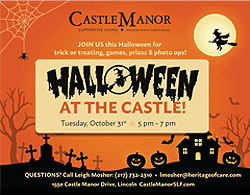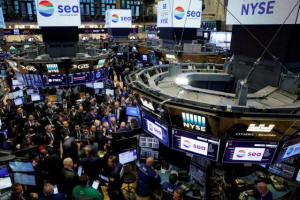Recent hurricanes take toll on quarterly earnings
 Send a link to a friend
Send a link to a friend
 [October 21, 2017]
By Noel Randewich [October 21, 2017]
By Noel Randewich
SAN FRANCISCO (Reuters) - After raging over
the southern United States and Puerto Rico, remnants of hurricanes
Harvey, Irma and Maria are now dampening U.S. corporate profits.
While the deadly storms in August and September slammed insurers who are
now on the hook for billions of dollars in damaged property, many
retailers, manufacturers and banks are also feeling the pain.
Over half of S&P 500 companies reporting third-quarter results in recent
weeks, including Harley-Davidson <HOG.N>, Delta Airlines and Costco
<COST.O>, have said on conference calls with investors that the storms
harmed their businesses to some degree, according to a Thomson Reuters
analysis.
"We estimate the impact of the hurricanes accounted for approximately
1.5 to 2 percentage points of Harley-Davidson's retail sales decline
during the quarter," the motorcycle maker's Chief Financial Officer,
John Olin, told investors on Tuesday after reporting a decline in
quarterly profit per share.

The hurricanes were part of the worst Atlantic hurricane season in over
a decade, destroying or damaging homes, businesses and public
infrastructure, killing over 200 people and paralyzing normal economic
activity.
Senior executives of least 48 S&P 500 companies have told investors on
quarterly conference calls that their businesses had been negatively
affected by the storms.
At least 12 companies, including U.S. Bancorp <USB.N> and Abbott
Laboratories <ABT.N>, also said their businesses were hurt by a
September earthquake that killed 369 people in Mexico, a major market
for U.S. firms.
American International Group <AIG.N> has estimated pretax losses of
about $1 billion each from Harvey and Irma, up to $700 million from
Maria and additional catastrophe losses, including Mexico's earthquake,
of about $150 million.
Travelers Cos Inc said on Thursday it recorded $700 million in
catastrophe losses from the destruction wrought by Hurricanes Harvey and
Irma, although its quarterly profit fell less than Wall Street feared.
S&P 500 companies on average are expected to have increased their
non-GAAP earnings per share by 4.2 percent in the third quarter, the
slowest growth in a year, according to Thomson Reuters I/B/E/S.
Excluding insurers, which are expected to have suffered a 63.3-percent
decline in quarterly profits, S&P 500 earnings are expected to be up 6.9
percent.

The lingering effects of Hurricanes Harvey and Irma hobbled activity at
factories in September and blunted a rebound in U.S. industrial
production, the Federal Reserve said on Tuesday
Still, the storms have not stopped the stock market's record advance. Up
15 percent in 2017, the benchmark S&P 500 is trading at 18 times
expected earnings, a multiple not seen since 2002, according to Thomson
Reuters Datastream.
[to top of second column] |

Traders gather for the IPO of Singapore-based Sea Limited on the
floor of the New York Stock Exchange (NYSE) in New York, U.S.,
October 20, 2017. REUTERS/Brendan McDermid

The S&P 500 property and casualty index <.SPLRCINPC> on Friday hit a record
high, more than recovering from a selloff that coincided with the Harvey's
destruction. Many investors believe that insurers will raise premiums to make up
for losses, and that those higher premiums will become permanent.
Dover <DOV.N> Chief Executive Robert Livingston said overtime and other related
expenses to get back up to speed had cost the manufacturing company as much as 2
cents per share in the quarter after Harvey forced it to close its Texas
factories for four or five days.
Hand tool maker Snap-On <SNA.N> said the storms cost it about $8 million in
sales in Texas, Florida and Puerto Rico.
"Timing of both further disruption and rebuilding are unclear," Snap-On Chief
Executive Nicholas Pinchuk told analysts on Thursday.
Waiving late fees and increasing reserves for customer credit cost PayPal
Holdings <PYPL.O> about 1 cent per share in the past quarter, leaving its
non-GAAP EPS at 46 cents.
Procter & Gamble <PG.N> on Friday said it had to suspend operations along the
Gulf Coast due to the hurricanes and in Mexico because of the earthquake.
Some companies, including Constellation Brands <STZ.N>, said the hurricanes had
only a minor negative on their results. For others, the storms will mean new
business.

With 600,000 homes in Texas and Florida in need of re-roofing, shares in
building materials firms USG Corp <USG.N>, Owens Corning <OC.N> and Eagle
Materials Inc <EXP.N> have jumped between 17 percent and 30 percent since just
before Harvey struck Texas.
Home Depot <HD.N> has surged 9 percent since the end of August on bets that
homeowners repairing damage will spend more at its stores.
"They were hurricanes of a massive size that caused significant disruption to
labor forces and spending," said Phil Blancato, head of Ladenburg Thalmann Asset
Management in New York. "But it's a pendulum, early on it has an impact, but as
the rebuild gets going and there's an inventory ramp-up, I think it swings back
the other way."
(Reporting by Noel Randewich; Editing by Bernadette Baum)
[© 2017 Thomson Reuters. All rights
reserved.] Copyright 2017 Reuters. All rights reserved. This material may not be published,
broadcast, rewritten or redistributed.
 |